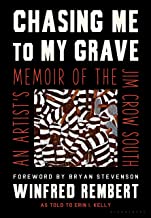Chasing Me to My Grave: An Artist’s Memoir of the Jim Crow South by Winfred Rembert 2021
In this remarkable book, Winfred Rembert recounts a life filled with sorrow, pain, suffering, and ultimately love, art, accomplishment, and honor.
Rembert, who died in March, 2021 around the time of the book’s publication, was born in Cuthbert, Georgia at nearly the same time that I was born in Chicago, but our childhoods and early lives were as different as if we’d been born on other planets. I had a solid, middle class family who despite some antisemitic prejudice, enjoyed safety, security, and aspirations for their children. Rembert, in contrast, lived in a South that was deeply segregated and in which Black people were viewed and treated as ‘animals’. As Rembert recalls, “I think they made things just to hit us with, because they treated us just like they would treat a pig, a cow, or a hog. They thought we were animals just like that, so they had to control us in the same manner as they did the other animals on the farm.”
This deep-seated message of inferiority was translated into action when Rembert was given up by his birth mother, shut out of school so he didn’t learn to read or write, and nearly lynched by a crowd after he stole a car to escape from some whites who were intent on killing him. Jailed for 2 years before his trial, he was sentenced to 27 years and spent eight of them in the Georgia prison system working on a chain gang. Prison ended up providing him with an education and some skills and also afforded the random contact with his future wife, Patsy.
The story of how this man overcame these incredibly traumatic early years, fought to support his six children, discovered his talent for painting on leather, shared that talent through hundreds of works of art that hang in distinguished museums (among them Yale was the first to show his work.), and was honored by his home town and many arts organizations is a moving tribute to the human spirit.
The book was a joint effort between Rembert and Erin Kelly, a philosophy professor at Tufts, who interviewed him for hours and transcribed his words into book form. The book is enriched with reproductions of dozens of his works—-brightly colored depictions of people in Cuthbert and the chain gangs. The latter, striking in their black and white striped patterns, are very powerful works.
This is another eye-opening book that reminded me of the inequities and brutality of prejudice, a prejudice that was de jure, not just de facto, in the South. The remnants of Wallace, Maddox, and the common man in the Jim Crow South is painfully related as is the bravery of those who fought to end it. A fine foreward by Bryan Stevenson introduces the book.



